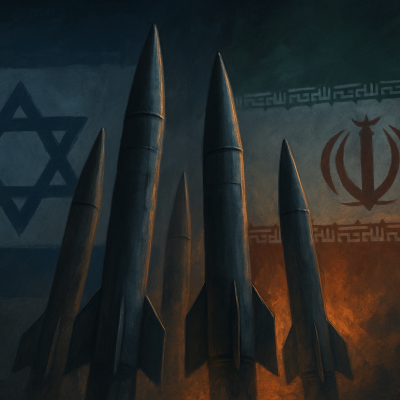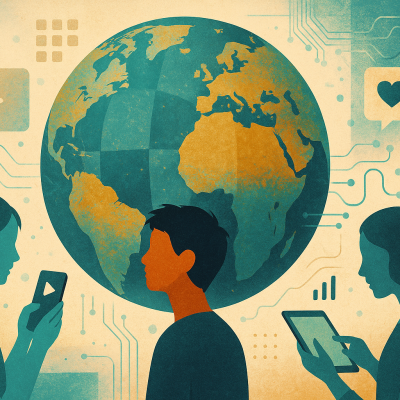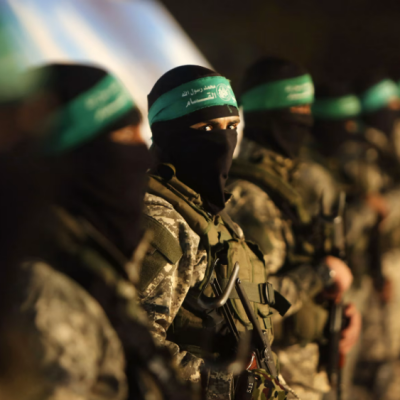In an era defined by globalization, international cooperation, and cross-cultural communication, intercultural dialogue has emerged as an essential concept in disciplines such as philosophy, sociology, political science, and linguistics. The growing interconnectedness of societies underscores the urgent need for constructive cultural exchanges. Despite debates surrounding interculturalism’s ideological basis, its significance continues to grow, offering pathways to mutual understanding and cooperation in an increasingly polarized world.
Education: A Strategic Tool of Soft Power
In the context of a multi-polar geopolitical landscape, escalating international tensions, and cultural divisions, education has gained recognition as a strategic instrument of “soft power.” As defined by Nye (1990, 2006), soft power enables a nation to attract and co-opt rather than coerce, relying on cultural appeal, shared values, and intellectual influence.
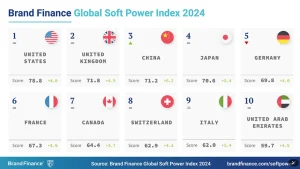
Education, when ethically and strategically deployed, can serve as a transformative tool of soft power by fostering intercultural dialogue, shaping global values, and addressing contemporary geopolitical challenges.
Examining the theoretical foundations, practical strategies, challenges, and ethical considerations of using education as a tool of soft power reveals not only its transformative potential but also the complexities involved in leveraging education to foster global influence and cooperation.
Theoretical Framework: Soft Power and Interculturalism
Soft power is rooted in a nation’s ability to attract and persuade through non-coercive means, including culture, diplomacy, and education. Nye (2004) identifies education as a key element of cultural soft power, enhancing a nation’s global appeal and fostering intellectual and cultural exchange. As Radikov (2012) emphasizes, soft power’s effectiveness lies in cultivating shared values and attitudes within and beyond national borders.
Interculturalism complements soft power by advocating for active dialogue and mutual respect among diverse cultures. Unlike multiculturalism, which emphasizes coexistence, interculturalism fosters dynamic exchanges that challenge ethnocentrism and promote collaboration. Scholars like Kramsch (1993) and Byram (1997) highlight the importance of “intercultural competence” — the ability to engage critically and reflectively with other cultures while maintaining one’s cultural identity.
Challenges to Interculturalism in a Multi-Polar World
However, the once-infallible ideological concept of interculturalism now faces challenges, especially within a multi-polar world. Subtle desires for certain national values to dominate are becoming more overt, leading to cultural expansion and, in some cases, cultural imperialism, as described by Edward Said. These dynamics are particularly evident in education, which is often regarded as one of the most powerful tools of “soft power.”
This evolution raises several important questions: Can education truly function as a form of soft power? How does the concept of interculturalism integrate into educational frameworks? Could this concept evolve into a structured educational approach that shapes global consciousness? If so, what would this entail, and in which settings might it be most effective? Finally, what conditions are necessary for such an approach to succeed? Addressing these questions could refine educational strategies, improve intercultural communication, and help shape responses to the shifting geopolitical landscape.
Expanding the Scope of Soft Power: The Notion of Smart Power
As the importance of soft power grows in today’s interconnected world, its influence alone has proven insufficient to address the increasingly complex geopolitical demands faced by major global powers. While soft power traditionally relies on attraction and persuasion through culture, values, and policies according to Nye, its limitations in achieving immediate or decisive outcomes have prompted the evolution of more dynamic strategies.
This gap has led to the widespread adoption of “smart power”, a concept that blends soft power’s appeal with hard power’s coercive tools — such as military force or economic pressure — to create a more effective and strategic approach.
Smart power operates by integrating elements of both attraction and coercion, employing a combination of educational diplomacy, economic incentives, and, when necessary, controlled use of force to navigate multifaceted global challenges. In this context, efforts have also been made to reinforce soft power through less conventional methods, including “controlled chaos,” managed disorder, “color revolutions,” “information warfare,” and “cultural hegemony” according to Shabalov, a Russian geopolitical analyst known for his work on hybrid warfare and the strategic use of cultural influence. These strategies demonstrate the increasingly fluid boundaries of soft power, extending its reach into cognitive, cultural, and civilizational contexts.
By utilizing guerrilla tactics and urban warfare tactics, the enemy’s vulnerabilities are well-exploited making it much more harder for the Israeli army to operate in densely populated areas and exposing Israel to more scrutiny and condemnation by the international community.
Moral Dilemmas of Evolving Strategies
This evolution intensifies moral dilemmas, pushing for a reexamination of spiritual and ethical values in the global discourse. Soft power is no longer purely “soft”; it is increasingly accompanied by forceful tools designed to influence individuals and societies.
A contradiction emerges from this evolution: while soft power is no longer purely “soft,” its potential has yet to be fully realized. As states increasingly integrate coercive elements into their strategies, the core ideals of soft power — dialogue, mutual respect, and cultural exchange — risk being overshadowed. Nonetheless, soft power remains an integral part of a nation’s moral and cultural strength, capable of responding to external challenges and countering emerging threats. Education, in particular, must serve as a moral compass, balancing its influence with ethical responsibility to uphold these ideals.
Education as a Hybrid Tool in Soft and Smart Power
Education stands out as a pivotal tool in these strategies, serving as a hybrid mechanism that blends the principles of soft and smart power. For example, scholarships and exchange programs can foster long-term cultural ties (soft power) while simultaneously advancing foreign policy goals tied to national interests (hard power). Similarly, educational diplomacy can subtly influence global perceptions while promoting strategic objectives, such as capacity building in key geopolitical regions.
- Scholarships and exchange programs can foster long-term cultural ties (soft power) while simultaneously advancing foreign policy goals tied to national interests (hard power).
- Educational diplomacy can subtly influence global perceptions while promoting strategic objectives, such as capacity building in key geopolitical regions.
Critical Questions for Future Exploration
Contradictions and Opportunities
In light of these dynamics, it is essential to explore the ethical and strategic complexities of education as a tool for soft power. While soft power remains integral to the moral and cultural strength of states and societies, its full potential has yet to be realized. By integrating elements of smart power, nations can leverage education not only as a means of cultural diplomacy but also as a tool to respond to external challenges and mitigate emerging threats.
A notable contradiction emerges in this evolution: Can education, as a tool of soft power, evolve to address the contradictions posed by the integration of hard power strategies? How can educational initiatives balance ethical considerations while advancing geopolitical objectives? What frameworks or conditions are necessary to ensure that education contributes to genuine intercultural dialogue rather than perpetuating cultural hegemony?
While education offers immense potential as a tool of soft power, it also carries significant risks and comes with ethical implications, particularly regarding the risks of cultural dominance and manipulation.Addressing these questions is essential to refining the role of education within the broader landscape of soft and smart power, ensuring it remains a force for global collaboration and ethical engagement.
Risks and Ethical Challenges
Cultural Dominance and Hegemony
Nations with greater resources may dominate educational narratives, imposing their cultural values and marginalizing local identities. For instance, Western educational frameworks often position themselves as universal standards, raising concerns about cultural homogenization.
Cultural Hegemony through Financial Influence
- Transnational funding can lead to the imposition of donor countries’ cultural values on recipient educational institutions, potentially marginalizing local cultures. For example, Confucius Institutes, funded by the Chinese government, have faced criticism for promoting Chinese cultural narratives while censoring sensitive topics, affecting academic freedom and potentially leading to cultural homogenization.
- Programs like China’s Confucius Institutes or U.S.-funded educational exchanges are often seen as instruments of soft power. These initiatives aim to shape global perceptions, but they risk embedding specific ideological agendas, as highlighted by Hartig (2012).
Dependency and Academic Integrity
- Reliance on foreign funding creates dependencies that challenge academic autonomy. Institutions may feel pressured to align with donors’ expectations, leading to self-censorship or biased research agendas. For example, U.S. universities have received significant funds from entities with differing political ideologies, testing the balance between financial support and academic freedom.
- Financial contributions from foreign entities can exacerbate polarization within campuses, especially when linked to contentious political issues. Donations from countries with controversial human rights records have triggered debates, forcing universities to balance free speech with ethical considerations.
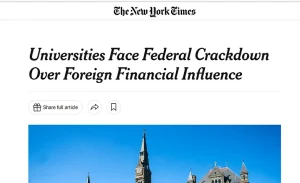
The New York Times,2019
Academic Freedom
Reports suggest that some educational programs, like Confucius Institutes, restrict discussions on topics sensitive to donor governments, such as Tibet or Taiwan. This compromises academic integrity and undermines genuine intercultural dialogue.
In Finland, a 2020 investigative report found that the Confucius Institute at the University of Helsinki attempted to limit public discussions on issues sensitive to China’s government, including Tibet.This led to the closure of the institute.
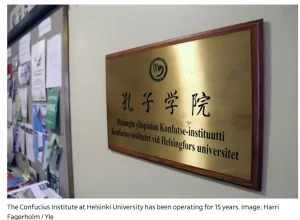
Governments may exploit educational programs for political agendas, jeopardizing their authenticity and diluting the potential for genuine cultural exchange. Historically, U.S. educational policies during the Cold War targeted regions to counter Soviet influence, prioritizing strategic interests over cultural diplomacy (Laifer and Kitchen,2017 ). Similarly, significant donations to U.S. universities from countries like China, Iran, North Korea and Qatar have sparked debates about their influence on academic content and institutional policies (NY Post, 2024).
Ethical Concerns
- Information Warfare: Leveraging education as a tool for information warfare challenges the boundaries of academic freedom and intercultural dialogue(Fitzpatrick,Gill,J.F. Giles, 2022).
- The UK has increasingly used education to counter foreign disinformation campaigns, particularly those linked to Russia and China. Initiatives like the Open Information Partnership (OIP) aim to combat disinformation through collaboration with educational institutions, teaching media literacy, and promoting critical thinking among students in Europe and Central Asia. The Arab League Educational, Cultural and Scientific Organization (ALECSO) promotes educational programs across member states to enhance cultural dialogue and counter disinformation. ALECSO emphasizes regional collaboration to uphold the integrity of information and foster academic freedom while supporting soft power initiatives in the Arab world.
- Geopolitical Agendas: Education initiatives, while fostering mutual understanding, often serve geopolitical purposes, creating risks of cultural imposition (Crespin, Cordell, and Waterston, 2021).
- Cultural Diplomacy vs. Propaganda: While educational initiatives often promote cultural diplomacy, they risk being perceived as propaganda if they prioritize state agendas over intercultural dialogue.
The Way Forward
To address these concerns, nations must develop transparent and collaborative frameworks that ensure educational initiatives prioritize academic freedom, mutual understanding, and intercultural dialogue over strategic manipulation.
References
Byram, M. (1997). Teaching and assessing intercultural communicative competence. Multilingual Matters.
Crespin, C., Cordell, B., & Waterston, A. (2022). Winning the Great Power Education: Revamping the U.S. Approach to Education Exchange.(2021).The Center for Strategic and International Studies (CSIS).
Fitzpatrick, K., Gill, G., & Giles, J. F. (2022). Information warfare: Lessons in inoculation to disinformation. The U.S. Army War College Quarterly: Parameters, 52(1).
Hartig, F. (2012). Confucius Institutes and the rise of China. Journal of Chinese Political Science, 17(1), 53–76.
Kramsch, C. (1993). Context and culture in language teaching. Oxford University Press.
Laifer, N. and Kitchen, N. (2017), Making Soft Power Work: Theory and Practice in Australia’s International Education Policy. Politics and Policy, 45: 813-840. https://doi.org/10.1111/polp.12219
Nye, J. S. (1990). Soft power. Foreign Policy, 80, 153-171.
Nye, J. S. (2004). Soft power: The means to success in world politics. PublicAffairs.
Nye, J. S. (2006). Think Again:Soft Power.Foregin Policy.
Radikov, I.V. (2012). “Soft Power” as a Modern Attribute of a Contemporary Great State, Journal World Economy and International Relations, 2, 18-26.
Shabalov, M.P. (2015). “Soft Power” in Modern Geopolitical Policy. Journal Strategic Priorities,
1, 48-59
The New York Times. (2019).Universities Face Federal Crackdown Over Foreign Financial Influence. Retrieved from www.nytimes.com
Yle News. (2020). University of Helsinki closes Confucius Institute amid concerns of academic integrity. Retrieved from yle.fi



